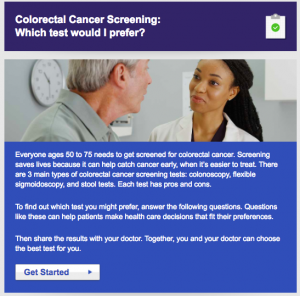Colorectal cancer is the second leading cause of cancer deaths in the United States, but regular screening can save lives by finding polyps (precancerous growths) before they become cancer. The USPSTF recommends screening everyone ages 50 to 75 for colorectal cancer.
Since there are different types of colorectal cancer screening tests, it’s important for clinicians to use shared decision making with patients when talking about these life-saving preventive services. Personal and family medical history can affect which type of test people need and how often they need to be screened, but patient preferences and values also play a role.
Colorectal Cancer Screening: Which test would I prefer? is an interactive tool on healthfinder.gov that can help people decide which colorectal cancer screening test they prefer. With an easy-to-use quiz format, the tool asks questions about users’ preferences and values, then provides a printable results page that users can share with their health care providers.
Colorectal Cancer Screening: Which test would I prefer? can help people understand:
- The pros and cons of each screening test
- Their personal preferences related to screening
- Any concerns they may want to raise with their doctor or nurse
The tool encourages providers and patients to use shared decision making for colorectal cancer screening. With proper screening, providers and patients can work together to prevent colorectal cancer and save lives. Share this resource with your patients to help them take charge of their health care and make the screening decision that’s best for them.




